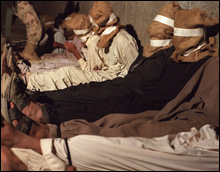
HOT POTATO? There are still detainees at Guantánamo.
|
It’s a morbid thought, to be sure, but could the recent suicide of three prisoners at the notorious US detention center have come at a better time for the release of The Road to Guantánamo?“Guantánamo has suddenly become a hot potato again,” says Mat Whitecross, who directed the film with Michael Winterbottom, over the phone from London. “Unfortunately, it takes something on this scale, it takes death to wake people up and take notice of what’s still happening there. A lot of people assume that somehow that issue’s gone away and we’re on to Iraq now or Iran and somehow Guantánamo’s either closed or they’ve only the hardcore left and everyone who’s innocent has been released. And that’s simply not the case. There’s still 460 people still there that we know of. And that’s not including all the ghost detainees and other detention centers around the world that no one knows about.”
Those in denial will find Guantánamo, which is based on the experiences of three young Britons released from the prison in 2004 after serving two years, hard to overlook with its grueling re-creations of US interrogation tactics. But might the fact that the scenes are re-creations, that the film is a hybrid of documentary and dramatization, weaken the filmmakers’ case? And how did Whitecross and Winterbottom corroborate the testimony of the three ex-prisoners that is the basis of the film?
“We did speak to a lot of people in preparation for making the film and even as we were filming,” says Whitecross. “Michael spoke to Chris Mackey, who’s the SAS officer interrogating the Tipton Three. And also to a couple of people who had been involved in translations in interrogations in Guantánamo. And we spoke to a journalist who’d been in Afghanistan and who’d been to Guantánamo on various occasions as well as the lawyers and other people.
“And it just felt like the normal traditional way of doing a documentary was something that we weren’t interested in doing. There have been some great documentaries made about Afghanistan and about Guantánamo Bay. So the whole story’s already been covered in that way. What we wanted to do is get the viewer into their [the prisoners’] mindset and tell this amazing story from the Tipton Three’s point of view.”
So is it a documentary? A drama? Is it supposed to convince or entertain?
“There’re so many kinds of . . . think of when Touching the Void came out. People were calling it a ‘docudrama’ or whatever. I don’t know. Someone was asking us why didn’t we make it a straight documentary, but the only way to make a documentary in a traditionally understood form is to be with them as everything was happening, and obviously that’s impossible. So the only way you could do it is with ‘talking heads.’ And it’s just not a very cinematic way of describing it to an audience. It’s much more engaging if you can re-create it with actors.